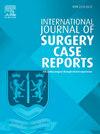Combined hepatocellular-cholangiocarcinoma in a middle-aged patient: A case report and review of therapeutic approaches
IF 0.6
Q4 SURGERY
引用次数: 0
Abstract
Introduction
Combined hepatocellular cholangiocarcinoma (cHCC-CCA) is a rare hepatic malignancy featuring both hepatocellular carcinoma (HCC) and cholangiocarcinoma (CCA) components, often leading to poor prognosis owing to its clinical complexity.
Case presentation
A middle-aged man presented with sudden abdominal pain and unexplained weight loss, leading to an initial diagnosis of CCA. The patient underwent laparoscopic left hepatectomy and lymph node dissection, and postoperative pathology confirmed cHCC-CCA with lymph node metastasis. Despite initial recovery, the disease recurred at 2 months and progressed to lung metastasis and multi-organ involvement by 7 months. Immuno-combination targeted therapy was ineffective, and the patient succumbed to the disease eight months after surgery.
Discussion
This case highlights the diagnostic and therapeutic challenges of cHCC-CCA, including its histological complexity, high recurrence rate, and limited treatment efficacy. Despite surgical resection, early recurrence and rapid progression to pulmonary metastasis were observed, emphasizing the need for improved treatment strategies for this condition. The failure of immune checkpoint inhibitors and targeted therapy suggests the need for alternative or combined therapeutic approaches.
Conclusion
Future research should focus on integrating molecular profiling into treatment selection, optimizing adjuvant therapies, and exploring novel targeted or immunotherapy combinations to improve the long-term outcomes. This report contributes to the growing evidence on cHCC-CCA and underscores the urgency of developing precise diagnostic tools and personalized treatment strategies.
求助全文
约1分钟内获得全文
求助全文
来源期刊
CiteScore
1.10
自引率
0.00%
发文量
1116
审稿时长
46 days

 求助内容:
求助内容: 应助结果提醒方式:
应助结果提醒方式:


